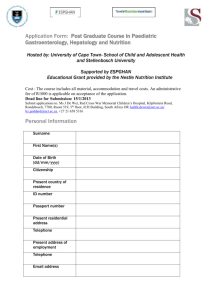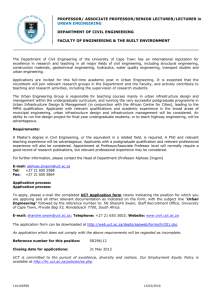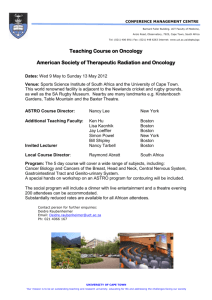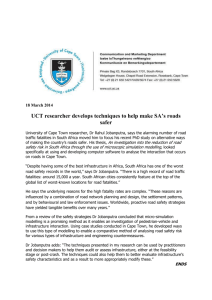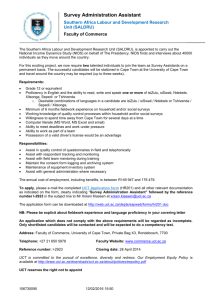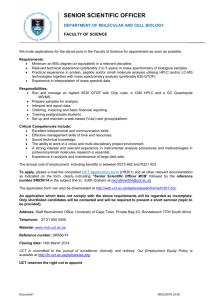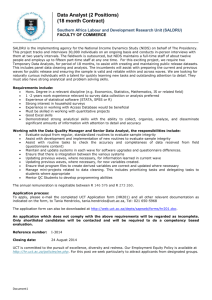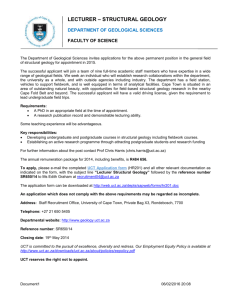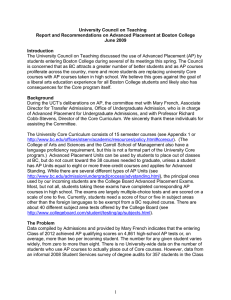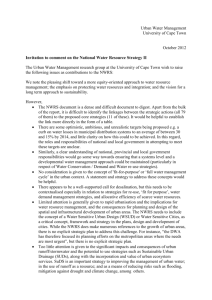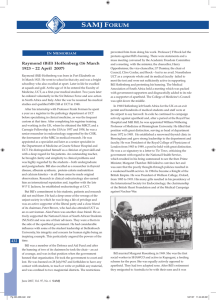Director: Children`s Institute
advertisement
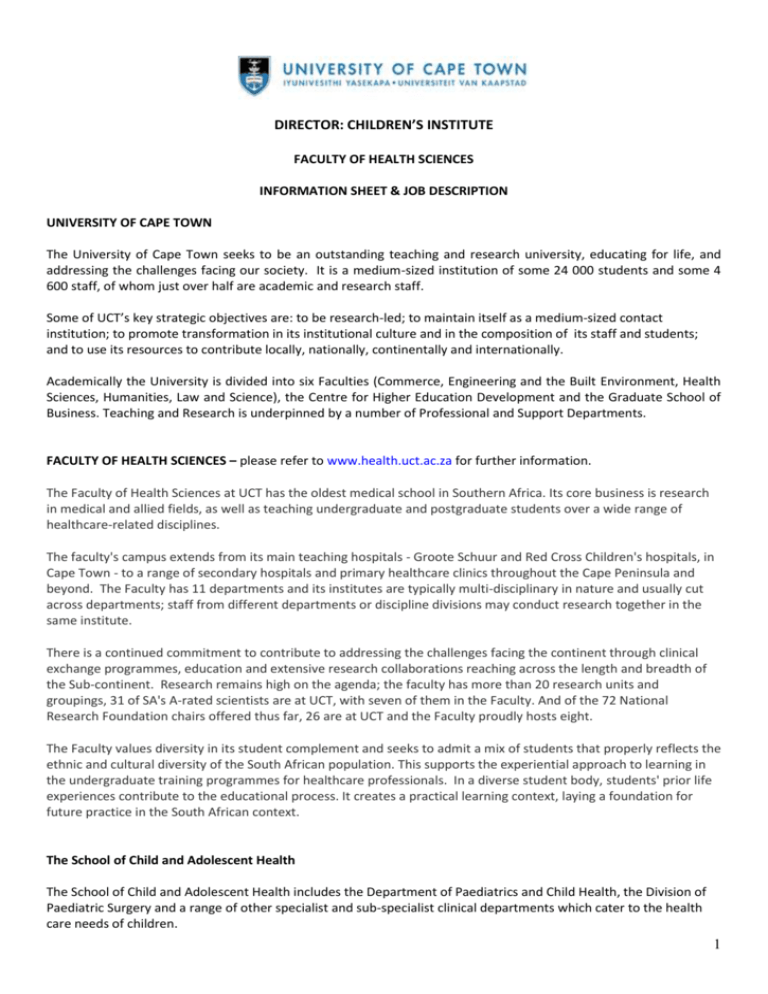
DIRECTOR: CHILDREN’S INSTITUTE FACULTY OF HEALTH SCIENCES INFORMATION SHEET & JOB DESCRIPTION UNIVERSITY OF CAPE TOWN The University of Cape Town seeks to be an outstanding teaching and research university, educating for life, and addressing the challenges facing our society. It is a medium-sized institution of some 24 000 students and some 4 600 staff, of whom just over half are academic and research staff. Some of UCT’s key strategic objectives are: to be research-led; to maintain itself as a medium-sized contact institution; to promote transformation in its institutional culture and in the composition of its staff and students; and to use its resources to contribute locally, nationally, continentally and internationally. Academically the University is divided into six Faculties (Commerce, Engineering and the Built Environment, Health Sciences, Humanities, Law and Science), the Centre for Higher Education Development and the Graduate School of Business. Teaching and Research is underpinned by a number of Professional and Support Departments. FACULTY OF HEALTH SCIENCES – please refer to www.health.uct.ac.za for further information. The Faculty of Health Sciences at UCT has the oldest medical school in Southern Africa. Its core business is research in medical and allied fields, as well as teaching undergraduate and postgraduate students over a wide range of healthcare-related disciplines. The faculty's campus extends from its main teaching hospitals - Groote Schuur and Red Cross Children's hospitals, in Cape Town - to a range of secondary hospitals and primary healthcare clinics throughout the Cape Peninsula and beyond. The Faculty has 11 departments and its institutes are typically multi-disciplinary in nature and usually cut across departments; staff from different departments or discipline divisions may conduct research together in the same institute. There is a continued commitment to contribute to addressing the challenges facing the continent through clinical exchange programmes, education and extensive research collaborations reaching across the length and breadth of the Sub-continent. Research remains high on the agenda; the faculty has more than 20 research units and groupings, 31 of SA's A-rated scientists are at UCT, with seven of them in the Faculty. And of the 72 National Research Foundation chairs offered thus far, 26 are at UCT and the Faculty proudly hosts eight. The Faculty values diversity in its student complement and seeks to admit a mix of students that properly reflects the ethnic and cultural diversity of the South African population. This supports the experiential approach to learning in the undergraduate training programmes for healthcare professionals. In a diverse student body, students' prior life experiences contribute to the educational process. It creates a practical learning context, laying a foundation for future practice in the South African context. The School of Child and Adolescent Health The School of Child and Adolescent Health includes the Department of Paediatrics and Child Health, the Division of Paediatric Surgery and a range of other specialist and sub-specialist clinical departments which cater to the health care needs of children. 1 The School is located at the Red Cross War Memorial Children’s Hospital and the Children’s Centre in Rondebosch, as well as facilities throughout greater Cape Town. The Children’s Institute The Children’s Institute (CI) conducts social, legal and economic research, which forms the basis for policy analysis and development, and for strategic engagement with government and civil society. A child rights approach guides much of the work, as do a multidimensional understanding of child poverty and careful attention to children’s experiences. Established in 2001 and administratively based in the Faculty of Health Sciences, the CI is a cross-disciplinary initiative with linkages to several research groups and academic departments in other faculties of the University. The CI’s mission is to contribute to policies, laws and interventions that promote equality and improve the conditions of all children in South Africa, through research, education, and advocacy. Current focal areas include: child rights and child law; social security, social services, education, health, HIV/AIDS, care, child poverty and inequality, and children’s participation in social dialogue. A director leads the CI and reports to the Dean of the Faculty of Health Sciences, who also serves on the CI’s Governing Board, which comprises senior academic staff drawn from different faculties across the University. An international Board of Advisors guides the CI’s research and advocacy agenda and reviews the quality of its work. The current director is due to retire in June 2012. We seek to appoint a successor director, on a three-year renewable contract from 1 July 2012, or as soon thereafter as possible. Further information on the Children’s Institute is available at www.ci.org.za. Job Purpose To provide intellectual and strategic leadership, to play a leading role in research, teaching and public engagement on policies, laws and services that affect children and to attract and develop staff of quality. To build and maintain strategic relationships whilst attracting funds to support the work of CI. Key performance areas and related activities 1. Strategic leadership Consolidate the identity of the Children’s Institute Position the Institute within the university, as well as nationally and internationally Initiate, maintain and build partnerships and alliances for socially responsive research, education and advocacy Oversee compliance with University procedures and transformation Oversee the formulation and implementation of the Institute’s strategies and, where necessary, instigate and support processes of change Ensure the breadth and diversity of the Institute by maintaining a productive balance in a range of areas, for example, between different disciplinary and intellectual traditions, between scholarly and popular publications, between research, advocacy and education. 2. Research and public engagement Be an active and productive scholar on issues relevant to the Institute’s mission and programme of research and public engagement. Use research findings to inform policy through a variety of channels Uphold the scholarly standards and promote the professional development of Institute researchers More broadly within UCT, promote and contribute to developing socially responsive research. 2 3. Fundraising Establish a strategy for, and actively conduct, national and international fundraising. Nurture and maintain relationships with funders Fund-raise specifically for multiyear core organisational requirements and research initiatives Support staff to raise project funds 4. Governance Manage CI’s relationship with the international Board of Advisors Establish and manage relationship with a university-based, cross-faculty Governing Board. Represent CI at executive level of UCT Report to governance structures on regular basis 5. Management Oversee staff recruitment, line-manage senior staff and facilitate competence-building and a positive work environment. With support from the finance officer and senior finance staff in the Faculty, ensure the preparation and presentation to the Board of the annual budget, budget revisions and financial statements. Public relations and information: actively communicate CI’s profile and its research contributions, both nationally and internationally. CHARACTERISTICS OF THE INCUMBENT Knowledge Knowledge and experience of the university environment Insight into policy orientated advocacy Skills and Abilities A proven track record in leadership and management at a senior level as well as in fund raising The ability to liaise with a range of stakeholders – in academia as well as in government, corporate and nongovernmental sectors Good interpersonal and communication skills Qualifications and experience Significant research experience as evidenced in a publication record A PhD or equivalent professional experience in a relevant field: economics; education; geography; law; politics; psychology; public health; sociology; social anthropology; social development or social work, or related field. 3
